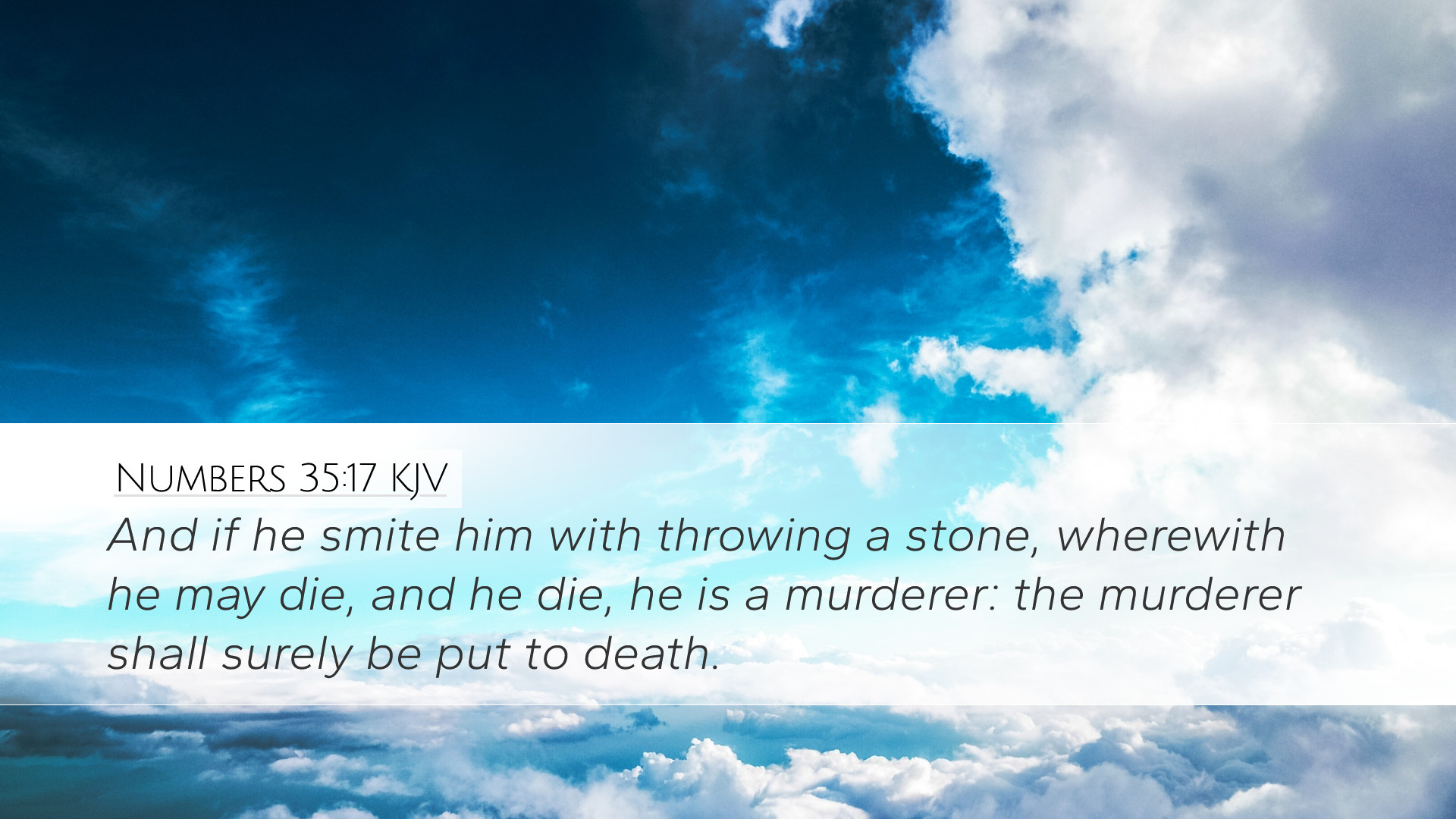Commentary on Numbers 35:17
Verse: Numbers 35:17 - "And if he smite him with a hand weapon, of any sort of weapon of iron, and he die, he is a murderer: the murderer shall surely be put to death."
Introduction
The significance of Numbers 35:17 lies in its legal and moral framework for ancient Israel regarding murder and punishment. This verse is part of a larger context where God establishes cities of refuge and laws to differentiate between unintentional manslaughter and premeditated murder. The differentiation is crucial in understanding God’s justice and His intentions for societal order.
Historical Context
In ancient Israel, a clear legal system was essential for maintaining societal order. The Israelites had just received the law following their exodus from Egypt, and now, within the Promised Land, they needed regulations to govern their newly formed community. The cities of refuge provided safe haven for those accused of manslaughter, while also establishing a procedure for dealing with murderers. This balances mercy for the unwitting perpetrators and justice for the grievous crimes against human life.
Commentary Insights
-
Matthew Henry's Observations
Matthew Henry emphasizes the gravity of murder and the moral obligation that accompanies the sanctity of human life. He notes that the deliberate act of murder is a serious crime against God and society. Henry insists that the purpose of such laws is to deter individuals from enacting violent crimes, thereby preserving community integrity and reflecting God’s holiness.
-
Albert Barnes' Analysis
Albert Barnes highlights the distinction between different kinds of deaths within this legal framework. He notes the specific mention of a “hand weapon” suggests a degree of intention behind the act. Barnes elaborates on the implications of using a lethal weapon, indicating premeditation or malice, thus aligning the act with moral culpability. He underscores that the severity of punishment reflects the value God places on human life.
-
Adam Clarke's Interpretation
Adam Clarke takes a theological perspective, discussing the ramifications of murder not just legally but spiritually. Clarke stresses that murder is not solely a societal issue, but a violation of God's commandments. He asserts that the ultimate consequence of murder is separation from God, reflecting the deeper spiritual truths behind the legislation. In this light, Clarke notes that while the physical punishment of death is mandated, it serves as a reminder of the seriousness of sin within the covenant community.
Theological Implications
Several theological themes emerge from Numbers 35:17:
-
The Sanctity of Life:
At the core of this verse is the principle that life is sacred; hence, taking a life unlawfully incurs severe penalties. This reflects God's creation intent where humanity is made in His image, showcasing His desire for justice and protection for the lives He creates.
-
Justice and Mercy:
The legal system established in the Israelite community represents a balance between justice and mercy. Cities of refuge provide a means for protection against the avenger while still holding individuals accountable for their actions. This duality showcases the nature of God's justice, as He desires truth and righteousness to prevail.
-
Community Morality:
This verse calls upon the community to uphold moral standards and accountability. The prescribed punishment served as a deterrent against potential murderers, fostering a culture where life is valued and respected amongst the Israelites.
Practical Applications
Numbers 35:17 provides modern readers with several pertinent lessons:
-
Understanding the Value of Life:
In a world often haunted by violence and disregard for human dignity, this verse challenges believers to advocate for the sanctity of life in all forms, campaign against violence, and strive for peace in their communities.
-
The Need for Justice:
Christians are called to seek justice not just for themselves but in broader societal structures. Advocacy for laws that protect life aligns with biblical teaching on justice being a foundational element of society.
-
Moral Accountability:
This passage serves as a reminder for personal accountability in one's actions, especially as they pertain to the broader community. Pastors and leaders should encourage their congregations to not only abide by the law but to understand the moral implications behind their actions.
Conclusion
Numbers 35:17 reflects a robust understanding of the moral foundation laid by God for His people. The insights from various public domain commentaries encourage a deeper engagement with the text, showcasing its relevance across generations and its implications for a moral society grounded in biblical principles. As believers, we are called to uphold the sanctity of life, advocate for justice, and embody a moral framework that honors God's commandments.


